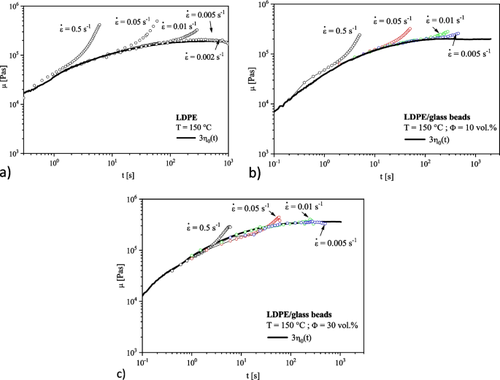Melt strain hardening of polymeric systems filled with solid particles: review and supplementary experimental results
Abstract
Melt strain hardening is an interesting characteristic property of the elongational flow of polymers. While strain hardening of many unmodified polymer melts has been widely discussed, a comprehensive presentation of the influence of particles on this property is missing. Using literature data and own measurements, the effects of solid particles of various geometries are compared. Micro-sized particles generally reduce melt strain hardening and may even lead to strain thinning. This behavior is postulated to be due to shear flow components around the particles and resulting shear thinning of the polymer matrices that reduces the resistance to flow. More complex is the influence of nano-sized fillers and layered silicate nanoparticles, in particular. Weakly exfoliated particles show effects similar to micro-fillers, but for strongly exfoliated silicates distinct strain hardening is observed that increases with decreasing elongational rate. This behavior is particularly pronounced for polymers modified with maleic anhydrides and thought to be related to electrostatic forces between exfoliated platelets of the silicates and polymer molecules hindering molecular motions.


 求助内容:
求助内容: 应助结果提醒方式:
应助结果提醒方式:


